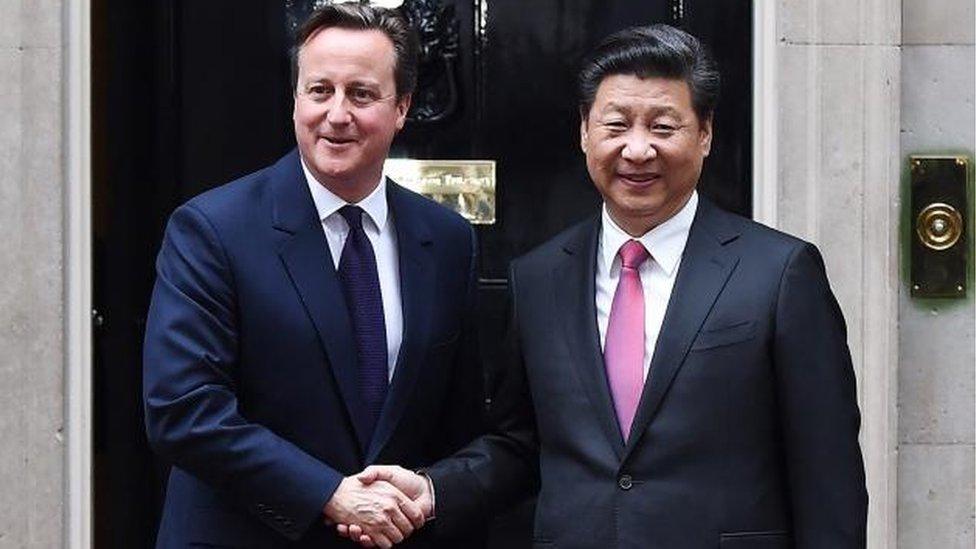China admits – our reputation is on the line over nuclear security
- Published
- comments
Kamal Ahmed interviews Zheng Dongshan, senior vice-president of the Chinese state nuclear business, CGN
On the day when the largest ever inward investment deal is signed in the UK, the head of the Chinese nuclear consortium charged with delivering new nuclear energy to millions of UK consumers has admitted he understands concerns about security.
And that he wants to use British "partners" to build the three new nuclear plants announced today - which amounts, the government will hope, to a pledge to use UK workers and suppliers.
Zheng Dongshan, senior vice president of the Chinese state nuclear business, CGN, (and therefore, of course, a leading member of the Communist Party) told me that China wants to protect its reputation and would do nothing to put that at risk.
The multi-billion pound deal signed today between the UK and Chinese governments means that if everything goes to plan - and that is certainly a huge, hairy if given the regular delays in any nuclear project - the first new nuclear power station for 30 years could be operational by 2025.
And China will have a major role in building and operating it.
Following claims of Chinese cyber-attacks on the UK and allegations that the country is involved in industrial espionage, I asked Mr Zheng why the British public should trust Chinese nuclear leaders bearing gifts.
Would China ever use its involvement in Britain's key energy infrastructure to exert political pressure?
"I would be 100% sure that that would not happen because actually we have to build our reputation, our image, and we have also the feeling of our responsibility to serve consumers," he told me.
"That is of upmost importance for us.
"I understand your concerns. I also understand the concerns of the UK public.
"But I want to say that nuclear safety is the concern of everyone, [and] as an operator of a nuclear power project, we always put the safety and the security at the top of everything.
"So, especially in the United Kingdom, we have a most stringent regulatory body regime, and what we do is on one hand to closely work with the regulator and on the other hand to comply with the regulations set up here, and of course we must keep always transparent with the local and UK public."
He said the relationship between the UK and China was "mutually beneficial" and that China wanted to "live here for several decades".
'Golden era'
On yesterday's Newsnight, David Cameron's special adviser, Steve Hilton, described China as a "rogue state" and that rolling out the red carpet for the state visit of President Xi Zingping was a "national humiliation".
I asked Mr Zheng about Mr Hilton's intervention.
"I think UK and China - the government announced we are entering a golden era. So we think that is the good answer to everything."
Does Mr Zheng believe Mr Hilton's opinions are out of date?
"I don't know. I think what we are going to do will certainly answer those kind of questions," he said.
In the end, many believe, this all comes down to money. Britain needs infrastructure investment, and China wants to provide it.
There aren't a plethora of other options.
"Well, I think Chinese money or [any] other kind of money actually for nuclear projects, we need money," Mr Sheng answered with a smile.

Chinese President Xi Jinping is currently on a state visit to the UK
EDF has certainly struggled to find commercial partners for the Hinkley deal. Centrica pulled out and reports of Saudi Arabian involvement came to nothing.
Some have argued that China has invested in Hinkley as part of a longer plan to build and operate its own nuclear sites in the UK.
The inclusion of Bradwell in Essex as the third leg of the nuclear deal signed today suggests that they have been successful.
CGN will be the minority partner in Hinkley and the second planned station at Sizewell in Suffolk.
Vitally, at Bradwell, it will be the lead partner, with 66.5% ownership, compared to 33.5% for EDF.
Chinese nuclear will be in the driving seat.
Could that mean, I ask Mr Zheng, nuclear plants built with Chinese expertise, by Chinese workers supplied by Chinese businesses.
In fact, without much British input.
"We are here to create jobs," he told me.
"We are here to deliver a project which will certainly reliably supply electricity.
"We are also working with local suppliers, so such [a] commitment [is there] from CNG's side.
"We think that we will certainly not bring a lot of Chinese workers, but what we need is to bring Chinese expertise, and experts here to serve the project, to work with the local UK people and partners."